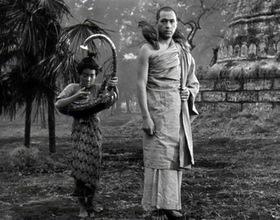
Scene from "The Burmese Harp," 1957 Academy Award nominee for Best Foreign Language Film and one of the movies to be screened at CCNY's Cherry Blossom Film Festival.
The City College of New York Libraries celebrate Japanese culture by hosting a Cherry Blossom Film Festival April 28 – May 5 in the Cohen Library Archives Reading Room on the fifth floor of the North Academic Center. During the festival, four noted Japanese films with socio-cultural themes from CCNY’s collection will be screened in their entirety or partially. Four East Asia scholars from CCNY, Baruch College and Yale University will host and/or discuss the films, as well.
The festival will also help promote a tsunami and earthquake relief fundraising campaign being conducted by CCNY libraries. “Film festival and student pre-sale book sale attendees will be happy to know that all the monies we will raise will go directly to Okawa Elementary School with no overhead costs involved,” said Pamela Gillespie, dean and chief librarian. A donation box will be on hand at all events.
CCNY in general, and Cohen Library, in particular, have strong ties with Japan. The College’s founder, Townsend Harris, opened the first U.S. consulate in Japan in the city of Shimoda in 1856. Every summer, a delegation from Shimoda visits Cohen Library to pay homage to Mr. Harris, who is revered in Japan for opening trade with the West.
These bonds prompted Dean Gillespie and Professor Rob Laurich, chief of user services and collection development to start a disaster relief fundraising effort. Yoko Inagi, chief of cataloging, established contact with the principal of Okawa Elementary School in Miyagi prefecture, which was devastated by the disaster; only 34 of the 108 students and 3 of the 13 teachers survived.
The festival is supported by a grant from the Japan Foundation. CCNY Libraries acquired the four films being shown at the festival through a collection development grant from the Northeast Asia Council of the Association for Asian Studies in conjunction with the Japan-U.S. Friendship Commission.
Cohen Library can be accessed on the second floor of the North Academic Center building on the City College campus at 160 Convent Ave., New York. Film titles, show times, synopses, and speakers follow:
“Monochrome Terror -- Black Rain, the Japanese Novel and the Film” 2 – 3:30 p.m Thursday, April 28.
Clips from the 1989 Japanese film based on Ibuse Masuji’s novel, which centers on the aftermath of the atomic bombing of Hiroshima. Talk and Q&A with CCNY Professor of Asian Studies Akemi Reeves.
12 noon – 1:30 p.m. Tuesday, May 3, “Postwar Japan and Asia as Seen in The Burmese Harp.”
Clips from the 1957 Academy Award nominee for Best Foreign Language Film. One of the first dramas to portray the decimating effects of World War II from the Japanese Army’s point of view. Talk and Q&A with CCNY Professor of History Barbara Brooks.
2 – 4:30 p.m., Wednesday, May 4, “Osaka Story: A ‘Korean’ and ‘Japanese’ Family Saga”
Filmmaker Toichi Nakata returns home to Osaka from abroad and turns his camera on his Korean-Japanese family, exposing all its visible schisms and hidden fault-lines. Full screening with an introduction and Q&A with Youngmi Lim, professor of modern languages and comparative literature, Baruch College.
12 noon – 2 p.m. Thursday, May 5, “Shinjuku Boys and Queer Tokyo Today”
Full screening of remarkable documentary about the complexity of female sexuality in Japan today. It follows the lives and work of three onnabes, women who live as men and have girlfriends, but don't usually identify themselves as lesbians. Introduction and Q&A with John Treat, professor of East Asian languages and literature, Yale University.
About the Speakers
Akemi Reeves received her PhD in modern Chinese literature from the University of London in England. She teaches Sino-Japanese cultural studies, literary studies and film studies at CCNY.
Barbara Brooks is a CCNY specialist on modern East Asia, particularly the Japanese Empire. She is currently working on a book on citizenship, gender, and ethnicity in the Japanese Empire down to 1945. Her first book, “Japan’s Imperial Diplomacy: Consuls, Treaty Ports, and War in China, 1895-1938,” was published in 2000 by University of Hawaii Press.
Youngmi Lim teaches at Baruch College and CCNY. She is the author of the chapter “Zainichi Roots and Routes: The Invisible Diaspora among Naturalized Japanese of Korean Descent” in “Diaspora without Homeland: Being Koreans in Japan,” edited by Sonia Ryang and John Lie (University of California Press, 2009).
John Treat teaches Japanese literature and culture at Yale, where he is the Chair of LGBT Studies. He is the author of “Great Mirrors Shattered: Homosexuality, Orientalism and Japan” (Oxford University Press, 1999) and has served as editor of the “Journal of Japanese Studies.”